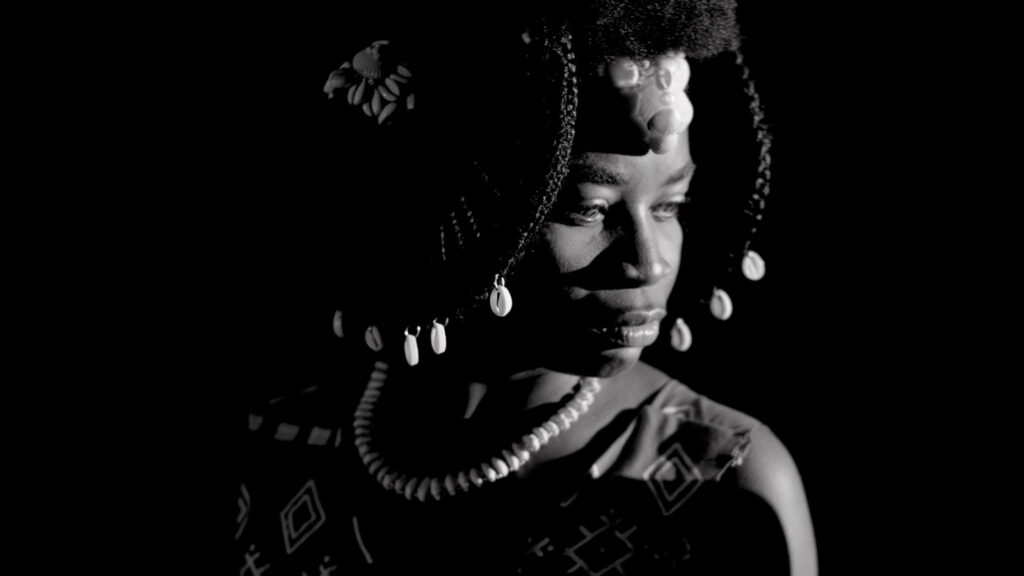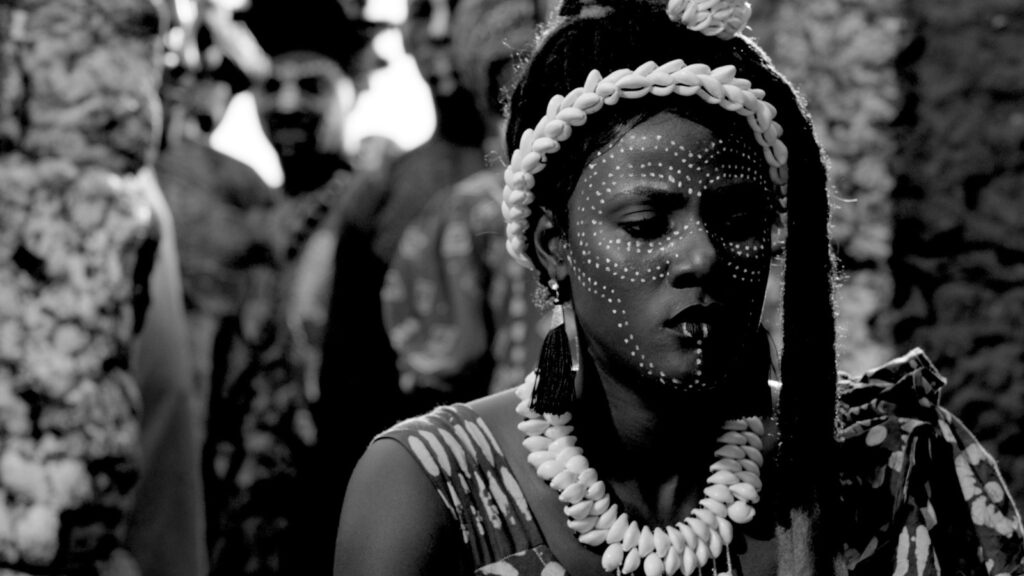Without exaggerating, Mami Wata belongs to a canon of its own. The film belongs to the same evergreen canon as Ousmane Sembene’s Black Girl, Tunde Kelani’s Saworoide, and Arie and Chuko Esiri’s Eyimofe. Mami Wata, save for a few noticeable plot mishaps, is cinema!
By Seyi Lasisi
From literature books and Hollywood blockbusters, European mythological figures – Thor, Zeus, Poseidon, and Dionysus – are familiar to me. Through pages and motion pictures, I was nourished by and relished the benevolence and atrocities of these omniscient European figures. Despite my proficient knowledge of these European pantheons, African mythological figures – Yemoja (Mami Wata), Sango (god of vengeance, protection, and social order), and Ogun (god of iron and war) – were a rarity in the content I consumed. But when I started seeing previews of C.J. ‘Fiery’ Obasi’s Mami Wata, Nigeria’s first homegrown feature-length film to premiere at the Sundance Film Festival, I counted myself privileged to have grown up in an environment where tales of the water goddess are dominant. While scarce onscreen, stories about the African deity are prolific in daily conversations around me. These stories, which undulate between belief and scepticism depending on the speaker’s conviction, allowed me to create my mental picture of this marine-inhabiting goddess. Obasi’s film replays those stories in my head, embracing a familiar belief that Mami Wata is an astonishingly beautiful goddess, distinct for her benevolence, and her slow but damaging fury. With each reveal in film festival circuits, and the constant attraction of distribution deals on European soil, Mami Wata (which won the coveted World Cinema Dramatic Special Jury Award for Cinematography at Sundance), imprints the legend of the goddess on viewers’ consciousness.
In the opening of this tale, a child dies in the fictional village of Iyi. Access to medicine could have saved the child, but in Iyi, led by Mama Efe (Rita Edochie), the matriarch and intermediary for Mami Wata, the village’s water goddess, hospitals are non-existent. The traumatic event propels a series of related events that question not just Mama Efe’s authority, but also the goddess’ much-touted power. One of the village’s dissidents is Jabi (Kelechi Udegbe) who constantly questions Mami Wata’s power with the deriding phrase, ‘’Wia di Mami Wata power?’’His words, imbued in scorn, question Mama Efe’s and other villagers’ devotion to the water deity despite her failings. Sharing in this sentiment are Zinwe (Uzoamaka Aniunoh) and Prisca (Evelyne Ily Juhen), who in varying degrees question Mama Efe, their mother’s stoic conviction in worshipping Mami Wata. Washed into the village by the ocean is Jasper (Emeka Amakeze) who will play an important role in propelling the opposition between Mama Efe and Jabi and his entourage.

(Read also: What, Truly, is the African Story?)
Anchored on the cultural nuance of the fictional village of Iyi, the film employs the female water spirit as a channel through which the director questions the traditions of pre and post-colonial African societies. Despite the mounting records of failure and growing opposition, Mama Efe is unwavering in her devotion to the deity. Obasi, the director, secures the audience’s attention to follow through the tension between the headstrong and devoted matriarch as embodied by Mama Efe, and a seemingly modern and industrial-driven movement as represented by the male dissident, Jabi. The film touches on the volatile opposition between the representatives of matriarchy and patriarchy. Having been exposed to whiffs of modern advancements, Jabi is distrustful of Mama Efe’s archaic rulership. The film is well shrouded in political ethos, and well establishes the conflict between aggressive modernity and persuasive traditions.

Surfacing among the film’s conflict is the influx and subsequent intrusion of foreign domains in Iyi. There is a vocal opposition between Western influence and pre-established traditions, and pushing this dichotomy is Jasper and Jabi. Although Jasper does not articulate his opposition to the spiritual sovereignty of Mama Efe, the crucifix on his neck, instills in viewers’ consciousness, his kinship with Christianity. After revolting against Mama Efe’s institution, the disgruntled dissidents finally established their dominion on Iyi. On securing power, rather than improving the social conditions of the people of Iyi, they established themselves as looters and exploiters which is contrary to their known manifesto. Jasper and Jabi’s actions become rife with crime-ridden acts. Their apathy to making any effective change when they get political power passes across a message that societal change is not a result of just “good intention”, and that change is a product of well-thought-out plans and strategies.
(Read also: The Rise of Populist Rhetoric in Africa: Who Does the Voice of the People Really Benefit? )
There is a unification among all the characters in the film. Although playing understated roles, the passive appearance of the film’s extras is commendable. Udegbe’s acting as Jabi wears the depth of his well-layered role. The cadence and flaunting rhythm in his voice aligns with his dissenter’s disposition. There is something subtle yet powerful in Juhen’s acting as Prisca. Juhen’s naive facial expression, which draws the audience to her, hides her internalised conflict. Edochie constantly exudes a matriarch’s confidence in every of her appearance. The black-and-white patterned costume and makeup complement Lilis Soares’, the film’s cinematographer, statement-making cinematography. The visually appealing cinematography, aside from capturing the beauty of black bodies, makes a point of capturing the surrounding environment of the waterside. The waves and restless trees become a character in the film through Soares’ well-framed shots. The cross-continental cast and crew of Mami Wata ensure that perfection runs throughout the film.

(Read also: Painting a New Way of Seeing Africa: In Conversation With the Filmmakers Who Took Mami Wata Global)
The commendable aspect of the film is that it guides viewers. However, for Jasper, we do not receive a similar courteous treatment. All through the screen time, Jasper’s motivation is not articulated, and this makes his identity somewhat forced in the film. Jabi, as the leader of the dissident group, represents all that Jasper exemplifies. The plot stifles Jabi’s role to give ascendance to Jasper’s character.
Indie and art-house filmmakers with a penchant for experimentation in Nigeria have always been known not to court mainstream attention. While their films are great, and miles away from recognised patterns, they often receive mainstream snobbery due to their toned-down commerciality. Although Mami Wata has a similar art-house identity, it has its commercial appeal. While the film wants you to sleuth through the plot to pick up political clues in retrospection, it also allows for a casual watch. When you stop being a detective, this visually bejewelled work of art opens itself up for an enjoyable and light watch. The film, like the titular water goddess, is suffused with visually stunning bounties.
In its affirmative tone, the film succeeds in placing an indelible imprint about the female water spirit on viewers’ consciousness. The third act is solely dedicated to sequences that testify to the reality of Mami Wata’s power. Without exaggerating, Mami Wata belongs to a canon of its own. The film belongs to the same evergreen canon as Ousmane Sembene’s Black Girl (1966), Tunde Kelani’s Saworoide (1999), and Arie and Chuko Esiri’s Eyimofe (2020). Mami Wata, save for a few noticeable plot mishaps, is cinema!
Rating: 4.5/5
(Mami Wata is showing in the cinema)
Seyi Lasisi is a Nigerian student with an obsessive interest in Nigerian and African films as an art form. His film criticism aspires to engage the subtle and obvious politics, sentiments, and opinions of the filmmaker to see how it aligns with reality. He tweets @SeyiVortex.





This is just brilliant Seyi.